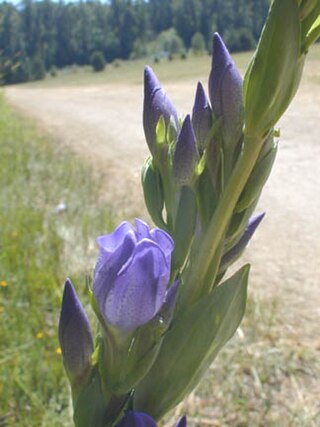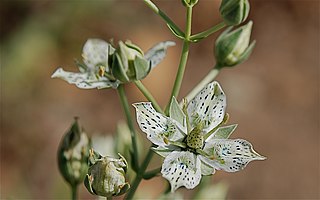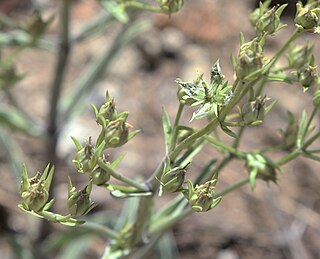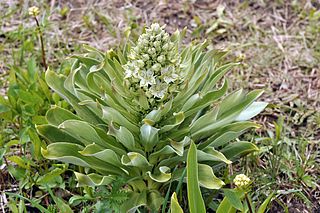
Gentianella is a plant genus in the gentian family (Gentianaceae). Plants of this genus are known commonly as dwarf gentians.

Gentiana newberryi is a species of gentian known by the common names alpine gentian and Newberry's gentian. It is a perennial herb found in western North America.
Gentiana plurisetosa is a rare species of Gentiana, known by the common names Klamath gentian and bristly gentian.

Gentiana sceptrum is a species of gentian known by the common names king's scepter gentian or king's gentian.

Gentiana setigera is a species of gentian known by the common name Mendocino gentian. It is native to southern Oregon and northern California where it grows in wet places in the California Coast Ranges. It grows in serpentine soils.

Gentianopsis is a genus of flowering plants in the gentian family known commonly as fringed gentians. These are similar to the gentians of genus Gentiana. Most have flowers which are blue to purple in color. They may be annual or perennial. They are native to Eurasia and temperate North America.

Gentianopsis holopetala is a species of flowering plant in the gentian family known by the common names Sierra fringed gentian or just "Sierra gentian"'. It is native to the Sierra Nevada and adjacent mountains in California and Nevada, in wet meadows from 6000 to 11,000 ft in elevation. This is an annual or perennial herb, growing stems which may be anywhere from a few centimeters long to nearly half a meter, and may lay along the ground or grow erect. Its small oval or spoon-shaped leaves are mostly basal but may grow sparsely further along the stem.

Centaurium calycosum is a species of flowering plant in the gentian family known by the common name Arizona centaury. It is native to northern Mexico and the southwestern United States, where it grows in moist places in otherwise dry habitat, such as riverbanks. This is an erect biennial herb growing up to half a meter tall. The widely lance-shaped leaves appear in a basal rosette and along the slender stem, each up to 7 centimeters long. The inflorescence is an open array of flowers on short pedicels. Each flower opens into five pointed lobes, each about a centimeter long and dark rose pink in color.
Kyhosia is a monotypic genus of flowering plants in the family Asteraceae containing the single species Kyhosia bolanderi, which is known by the common names Bolander's madia and kyhosia.

Pyrrocoma apargioides is a species of flowering plant in the family Asteraceae known by the common name alpineflames. It is native to the western United States from the Sierra Nevada of California east to Utah, where it grows in the forests and meadows of high mountains. It is a perennial herb growing from a taproot and producing one or more stems to 30 centimeters in length. The stems are decumbent or upright, reddish, and hairless to slightly woolly. Most of the leaves are located around the base. They are thick and leathery, lance-shaped with large sawteeth along the edges, often center-striped in white, and measure up to 10 centimeters long. The inflorescence is usually a single flower head lined with centimeter-long phyllaries which are reddish to green with red edges. The head has a center of yellow disc florets and a fringe of ray florets which are yellow, often splashed with red along the undersides, measuring up to 1.6 centimeters in length. The fruit is an achene which may be well over a centimeter in length including its pappus.

Nestotus stenophyllus is a species of flowering plant in the family Asteraceae known by the common name narrowleaf mock goldenweed. It was previously known as Stenotus stenophyllus. It is native to the western United States, especially the inland Pacific Northwest and northern Great Basin, where it grows in sagebrush habitat usually in rocky soil.

Frasera albomarginata is a species of flowering plant in the gentian family known by the common name desert green gentian, or desert frasera.
Frasera fastigiata is a species of flowering plant in the gentian family known by the common name clustered green gentian. It is native to the northwestern United States, where it grows in meadows and other mountain habitat. It is a perennial herb producing a single stem which grows erect and often exceeds a meter in height. The basal leaves have oval or spoon-shaped blades up to 30 centimeters long by 10 wide. Leaves higher on the stem may be smaller and narrower. Some of the leaves have white margins. The inflorescence is a dense panicle atop the stem, sometimes interrupted into a series of clusters of flowers. Each flower has a corolla of four pointed lobes each roughly a centimeter long. They are greenish, often tinged with yellow or blue. There are four stamens tipped with large anthers and a central ovary.
Frasera neglecta is a species of flowering plant in the gentian family known by the common name pine green gentian.

Frasera parryi is a species of flowering plant in the gentian family known by the common name Coahuila frasera.

Frasera puberulenta is a species of flowering plant in the gentian family known by the common name Inyo frasera.

Frasera speciosa is a species of flowering plant in the gentian family (Gentianaceae) known by the common names elkweed, deer's ears, and monument plant.
Frasera tubulosa is a species of flowering plant in the gentian family known by the common name Kern frasera.

Silene polypetala is a rare species of flowering plant in the family Caryophyllaceae known by the common names eastern fringed catchfly and fringed campion. It is native to Georgia and northern Florida in the United States. It is threatened by the loss and degradation of suitable habitat. It is a federally listed endangered species of the United States.

Gentianopsis virgata, commonly known as lesser fringed gentian, narrow-leaved fringed gentian, or smaller fringed gentian, is a biennial herbaceous species of plant, native to eastern USA and eastern Canada.














